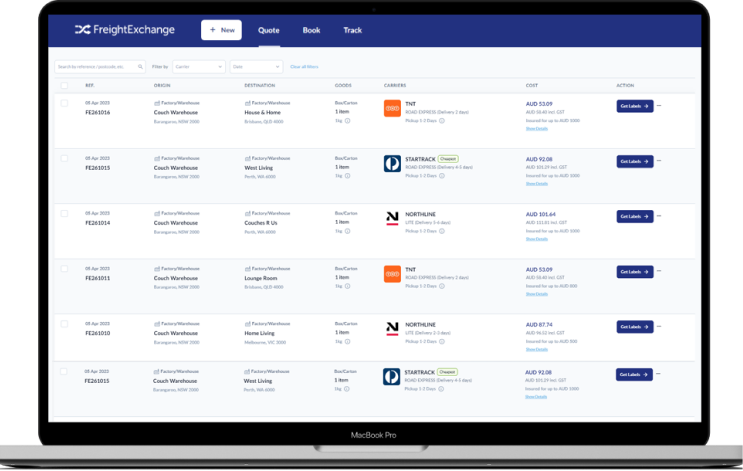As businesses rely heavily on efficient freight management to deliver their products to customers, it’s no surprise that heightened customer satisfaction is an essential facet of this process. In this article, we will explore various strategies that businesses can use to enhance customer satisfaction in freight management.
Before implementing any strategy be sure to understand the drivers of customer satisfaction. There’s no point delivering goods overnight at a high cost, if that’s not what customers want!
Customer Feedback
Customer feedback is essential to find areas that require improvement. Be sure to ask specifically about service expectations, how you communicate, share tracking, and delivery estimates. By addressing these issues proactively, businesses can improve customer satisfaction levels and build greater trust and loyalty.
Customer Segmentation
Every customer has unique requirements, and a one-size-fits-all approach isn’t an effective method when it comes to satisfying diverse customer needs. Businesses must categorise customers & orders based on their specific requirements and deliver a more personalised service.
By tailoring services, such as providing specialised packaging, customised delivery options, and dedicated customer support you can create greater satisfaction and retention in the future.
Reliability & Responsiveness
Reliability is one of the most crucial factors in freight management, and customers expect their shipments to arrive on time, every time. Punctuality is another critical factor, and businesses must ensure that the shipment arrives at the destination within the expected timeframe. Responsiveness is also essential, and customers expect prompt communication regarding the shipment’s progress. By identifying these key expectations, businesses can tailor their services to meet customer needs and improve satisfaction levels.
Communication & Transparency
The lack of transparency and misunderstandings during the shipment’s progress are the most prevalent causes of headaches for customers in the freight management industry. Customers now expect real-time updates and transparency from their service providers.
Real-Time Tracking
Real-time tracking solutions allow customers to view the shipment’s progress and stay updated on its location, improving communication and instilling a sense of trust in the business. By leveraging technology, companies can provide customers with accurate and up-to-date information on their shipments, which can help to prevent misunderstandings and delays.
Additionally, real-time tracking data can help companies to optimise their supply chain operations by identifying potential bottlenecks and inefficiencies.
Regular Shipment Status Updates
Regular updates assure customers that their shipment is on schedule and provide helpful reminders and information throughout the process. This creates a positive customer experience and strengthens the trust and relationship between the customer and the business. Companies can use automated systems to send regular updates to customers via email or text message, providing them with real-time information on their shipment’s status. This not only enhances communication but also helps to reduce the workload for customer service teams.
Streamlining Freight Management
The freight management process can be complex and time-consuming, which can lead to frustration for both businesses and customers. However, there are several ways to streamline the process and improve efficiency, resulting in greater customer satisfaction.
Technology & Automation
One of the most effective ways to streamline the freight management process is by investing in technology and automation. This can include implementing a freight management system (FMS) to optimise routing and reduce human error, as well as using barcode scanning to track shipments and inventory. By automating processes, businesses can significantly improve efficiency and reduce costs, ultimately resulting in faster turnaround times and happier customers.
Reducing Transit Times & Delays
Delays are a major concern for customers when it comes to freight management. Businesses must focus on reducing processing times, optimising transit times, and decreasing idle time to minimise delays. This can include using real-time tracking and monitoring systems to keep customers informed of shipment status, as well as working with carriers to optimise routes and reduce transit times.
Another way to reduce delays is by improving communication between all parties involved in the freight management process. This includes carriers, shippers, and customers. By keeping everyone informed of any potential delays or issues, businesses can help prevent frustration and maintain customer satisfaction.
Simplify Paperwork & Eliminate Manual Data Entry
Complicated documentation and paperwork can cause frustration for customers, especially when it comes to international shipments. Simplifying the process through automation or training employees to handle paperwork proficiently helps customers and businesses alike.
Businesses can also work with carriers and customs brokers to ensure all necessary documentation is completed accurately and efficiently. This can include providing clear instructions and checklists to help customers prepare their shipments for international transport.
Good Carrier Relationships
Customer satisfaction isn’t solely dependent on the business’s operations but also the carriers delivering their products. Businesses need to maintain good relationships with carriers to ensure that these partners provide exceptional service.
Having a good relationship with carriers can be the difference between a happy customer and a dissatisfied one. It’s not just about finding the cheapest option or the one that promises the fastest delivery. It’s about finding a carrier that shares the same values as your business and is committed to providing the best service possible.
Reliable and Reputable Carriers
It’s essential to select the right carrier for each shipment based on the destination, urgency, and other factors. Businesses must partner with reliable and reputable carriers that prioritise accuracy, responsiveness, and on-time delivery.
When selecting a carrier, it’s important to consider their track record. Have they consistently delivered on time? Do they have a reputation for damaged goods? These are all factors that can impact your business’s reputation, so it’s crucial to choose a carrier that you can trust.
Carrier Compliance & Performance
Businesses must monitor carrier compliance and performance regularly to ensure that the customer’s needs are consistently met. Providing feedback and essential data to carriers allows for process improvement on both ends.
Regular communication with carriers is crucial to maintaining a strong relationship. This includes providing feedback on their performance and addressing any issues that arise. It’s also important to share data with carriers to help them optimise their operations and improve their service.
In conclusion, building strong relationships with carriers is essential for any business that relies on shipping products to customers. By selecting reliable and reputable carriers, developing long-term partnerships, and ensuring compliance and performance, businesses can provide exceptional service that keeps customers coming back.
Conclusion
By better understanding customer needs, enhancing communication and transparency, simplifying processes, and building strong carrier relationships, businesses can create a positive and seamless experience for their customers.







